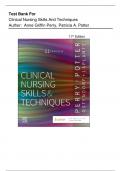Test Bank For
Clinical Nursing Skills And Techniques
Author: Anne Griffin Perry, Patricia A. Potter
11th Edition
,Complete Test Bank For Clinical Nursing Skills And Techniques 11th Edition By Anne
Griffin Perry, Patricia A. Potter Chapter 1-43 Complete Guide
Table Of Content
Chapter 1. Using Evidence In Nursing Practice
Chapter 2. Communication And Collaboration
Chapter 3. Admitting, Transfer, And Discharge
Chapter 4. Documentation And Informatics
Chapter 5. Vital Signs
Chapter 6. Health Assessment
Chapter 7. Specimen Collection
Chapter 8. Diagnostic Procedures
Chapter 9. Medical Asepsis
Chapter 10. Sterile Technique
Chapter 11. Safe Patient Handling And Mobility (Sphm)
Chapter 12. Exercise And Mobility
Chapter 13. Support Surfaces And Special Beds
Chapter 14. Patient Safety
Chapter 15. Disaster Preparedness
Chapter 16. Pain Management
Chapter 17. End-Of-Life Care
Chapter 18. Personal Hygiene And Bed Making
Chapter 19. Care Of The Eye And Ear
Chapter 20. Safe Medication Preparation
Chapter 21. Nonparenteral Medications
Chapter 22. Parenteral Medications
Chapter 23. Oxygen Therapy
Chapter 24. Performing Chest Physiotherapy
Chapter 25. Airway Management
Chapter 26. Cardiac Care
Chapter 27. Closed Chest Drainage Systems
Chapter 28. Emergency Measures For Life Support
Chapter 29. Intravenous And Vascular Access Therapy
Chapter 30. Blood Therapy
Chapter 31. Oral Nutrition
Chapter 32. Enteral Nutrition
Chapter 33. Parenteral Nutrition
Chapter 34. Urinary Elimination
Chapter 35. Bowel Elimination And Gastric Intubation
Chapter 36. Ostomy Care
Chapter 37. Preoperative And Postoperative Care
Chapter 38. Intraoperative Care
Chapter 39. Wound Care And Irrigations
Chapter 40. Impaired Skin Integrity Prevention And Care
Chapter 41. Dressings, Bandages, And Binders
Chapter 42. Home Care Safety
Chapter 43. Home Care Teaching
,Chapter 01: Using Evidence In Nursing Practice
Perry Et Al.: Clinical Nursing Skills & Techniques, 11th Edition
1. Evidence-Based Practice Is A Problem-Solving Approach To Making Decisions About Patient
Care That Is Grounded In:
a. The Latest Information Found In Textbooks.
b. Systematically Conducted Research Studies.
c. Tradition In Clinical Practice.
d. Quality Improvement And Risk-Management Data.
Ans: B
The Best Evidence Comes From Well-Designed, Systematically Conducted Research Studies
Described In Scientific Journals. Portions Of A Textbook Often Become Outdated By The
Time It Is Published. Many Health Care Settings Do Not Have A Process To Help Staff Adopt
New Evidence In Practice, And Nurses In Practice Settings Lack Easy Access To Risk-
Management Data, Relying Instead On Tradition Or Convenience. Some Sources Of
Evidence Do Not Originate From Research. These Include Quality Improvement And Risk-
Management Data; Infection Control Data; Retrospective Or Concurrent Chart Reviews; And
Clinicians‘ Expertise. Although
Non–Research-Based Evidence Is Often Very Valuable, It Is Important That You Learn To
Rely More On Research-Based Evidence.
Dif: Cognitivelevel: Comprehension Obj: Discuss The Benefits Of Evidence-Based
Practice. Top: Evidence-Based Practice Key: Nursing Process Step: Assessment
Msc: Nclex: Safe And Effective Care Environment (Management Of Care)
2. When Evidence-Based Practice Is Used, Patient Care Will Be:
a. Standardized For All.
b. Unhampered By Patient Culture.
c. Variable According To The Situation.
d. Safe From The Hazards Of Critical Thinking.
Ans: C
Using Your Clinical Expertise And Considering Patients‘ Cultures, Values, And
Preferences Ensures That You Will Apply Available Evidence In Practice Ethically And
Appropriately. Even When You Use The Best Evidence Available, Application And
Outcomes Will Differ; As A Nurse, You Will Develop Critical Thinking Skills To
Determine Whether Evidence Is Relevant And Appropriate.
Dif: Cognitivelevel: Application Obj: Discuss The Benefits Of Evidence-Based
Practice. Top: Evidence-Based Practice Key: Nursing Process Step: Assessment
Msc: Nclex: Safe And Effective Care Environment (Management Of Care)
3. When A Picot Question Is Developed, The Letter That Corresponds With The Usual
Standard Of Care Is:
a. P.
b. I.
c.
, Stuvia.com - The Marketplace to Buy and Sell your Study Material
c. Choice Blank
d. O.
Ans: C
C = Comparison Of Interest. What Standard Of Care Or Current Intervention Do You Usually
Use Now In Practice?
P = Patient Population Of Interest. Identify Your Patient By Age, Gender, Ethnicity, Disease, Or
Health Problem.
I = Intervention Of Interest. What Intervention (E.G., Treatment, Diagnostic Test, And
Prognostic Factor) Do You Think Is Worthwhile To Use In Practice?
O = Outcome. What Result (E.G., Change In Patient‘S Behavior, Physical Finding, And Change
In Patient‘S Perception) Do You Wish To Achieve Or Observe As The Result Of An
Intervention?
Dif: Cognitivelevel: Knowledge Obj: Develop A Pico Question.
Top: Pico Key: Nursing Process Step: Implementation
Msc: Nclex: Safe And Effective Care Environment (Management Of Care)
4. A Well-Developed Picot Question Helps The Nurse:
a. Search For Evidence.
b. Include All Five Elements Of The Sequence.
c. Find As Many Articles As Possible In A Literature Search.
d. Accept Standard Clinical Routines.
Ans: A
The More Focused A Question That You Ask Is, The Easier It Is To Search For Evidence In
The Scientific Literature. A Well-Designed Picot Question Does Not Have To Include All
Five Elements, Nor Does It Have To Follow The Picot Sequence. Do Not Be Satisfied With
Clinical Routines. Always Question And Use Critical Thinking To Consider Better Ways To
Provide Patient Care.
Dif: Cognitivelevel: Analysis Obj: Describe The Six Steps Of Evidence-Based
Practice. Top: Evidence-Based Practice Key: Nursing Process Step: Implementation
Msc: Nclex: Safe And Effective Care Environment (Management Of Care)
5. The Nurse Is Not Sure That The Procedure The Patient Requires Is The Best Possible
For The Situation. Utilizing Which Of The Following Resources Would Be The Quickest
Way To Review Research On The Topic?
a. Cinahl
b. Pubmed
c. Medline
d. The Cochrane Database
Ans: D
The Cochrane Community Database Of Systematic Reviews Is A Valuable Source Of
Synthesized Evidence (I.E., Pre-Appraised Evidence). The Cochrane Database Includes The
Full Text Of Regularly Updated Systematic Reviews And Protocols For Reviews Currently
Happening. Medline, Cinahl, And Pubmed Are Among The Most Comprehensive Databases
And Represent The Scientific Knowledge Base Of Health Care.
Dif: Cognitivelevel: Synthesis Obj: Describe The Six Steps Of Evidence-Based
Practice. Top: Evidence-Based Practice Key: Nursing Process Step: Implementation
Msc: Nclex: Safe And Effective Care Environment (Management Of Care)




